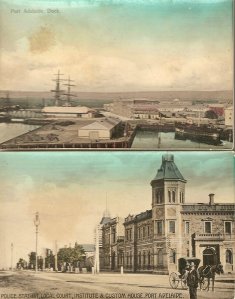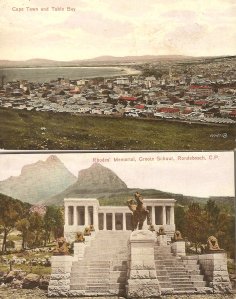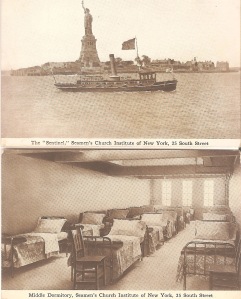Posts Tagged ‘Port Adelaide’
A sailor’s life – 27. Monkbarns: Captain Donaldson’s tribulations
In New York, autumn 1915, ten seamen deserted Monkbarns, leaving the old windjammer hanging around in the river for nearly two months. Bert Sivell wrote a dozen postcards featuring the South Street seamen’s institute and the mission launch off Liberty Island, but the log tells a different tale. The remaining fo’c’sle hands “liquored” and whored, and the ship’s steward decamped with most of the stores. One man was laid up with venereal disease after only a month in port. From early September to the end of October men trickled ashore and failed to return — Danes, Swedes, Finns, Norwegians, Americans and one Swiss, smuggling out what possessions they might and abandoning the rest. The very last to go, on October 24th, was out-of-time apprentice Geoff Barnaby, of King’s Lynn, Norfolk. He and Bert had signed their indentures together as boys in London four years previously and Bert felt his loss deeply.
Unlike the others, Barnaby’s desertion is not marked in the log with the official stamp of the shore authorities but is written in by hand, after the ship had put to sea, suggesting either that he disappeared at the last minute, or that Donaldson had given him the benefit of the doubt until the matter was beyond mending.
The Old Man was not always so accommodating. After they sailed, one of the new crew was found to be “quite incompetent and totally unfit” and ruthlessly demoted to £1 a month, “unless he shapes up”. The man deserted in Port Adelaide, Australia, three and a half months later, one of seven more to go.

Port Adelaide, Australia, 1916 - Bert sat his second mate's ticket behind the third lamp post, beside the police station. "Very safe"
As they loaded wheat for Cape Town in Port Adelaide, the mate quit and Bert was hurried packed off ashore to sit his 2nd mate’s exam in a building next door to the local police station. Writing home with the news, he discovered his postcard had been printed in Germany, for which he apologised. He still sent it. It did not occur to either him or his parents to tear the card up and write another. He had already paid for it, and the Sivells respected their money.
On the back of the sea-stained indenture paper that went round the world with him, Captain Donaldson had pencilled “Sivell to serve four years. Time expired on 15th August 1915. Signed AB and still on articles 17th February, Port Adelaide,” expanding it ashore with a letter to the effect that he was “diligent, obliging and attentive to his duties, a good seaman”.
In the log, Donaldson wrote:
“Three days have been lost trying to procure substitutes. Then I. Johnson refused to join, and J. Maloney was taken by the military as a deserter from their camp… It cost £3 19s to get R.H. Williams and G. West put on board … which is charged to their account.”
By Cape Town, three and a half months later, drunkenness and insubordination were rife. Two men landed in jail, one twice, and the baldly administrative log becomes quite colourful over the month and a half they were in port loading maize:

Postcard views of Cape Town, 1917 - printed in enemy Germany, Bert Sivell noted (author's collection)
“July 27th 1916, all day. George West who has a rupture of old standing going on shore drinking, coming on board and using insulting language to the master, and going and coming and raging and doing what he thinks fit.
July 31st, 8.30am A. Harris was insolent and insubordinate, and defying the master and mate, went on shore without leave. Also R.H. Williams.
August 2nd, noon R.H. Williams who was on shore the two days previous without leave is now laid up from the effects of liquor.
August 16th, 10am Fritz Jonson returned to work having been absent without leave since 8th inst., arrested same day ashore. Sentenced to seven days in jail. All expenses to be charged to him.
August 23rd, 1pm R.H. Williams returned to work after being in jail and absent without leave from 7th inst. Men were working in his and Jonson’s place, when they could be found to do suitable work. All outlays and expenses will be charged to them.
September 6th, 10 am R.H. Williams returned yesterday after being in jail for another seven days and is again absent without leave, and have been informed by Sergeant of Police that he is to be charged at police court tomorrow. Expenses, etc.
September 12th, 3pm R.H. Williams was put on board by police. His fine and police expenses were paid by the master and will be charged to him.
September 13th, 5pm, Table Bay, George West was taken on board the ship by police in motor launch…”
This is just one page.
In total, the fines, expenses and surcharges came to £7, but on December 11th 1916, two days before they docked back at Avonmouth, Donaldson cancelled the lot “on account of subsequent good conduct”. It was his way. He shied away from “rows” as he called them. Jones, Jonson, Williams and West left Monkbarns without a stain on their record, and went away to plague some other master. Bert, meanwhile, travelled to London to sit his Mate’s exam, with £64 11s and 7d jingling in his pocket. “I wish him success and hope he will (be)come 1st Mate of this ship,” wrote Donaldson.
*
A letter appended to the ship’s agreement offers a tiny personal glimpse of the embattled Old Man. It is addressed to a Board of Trade superintendent, apparently in response to a query about sums of cash Captain Donaldson had advanced to the men who deserted in Port Adelaide. “Sir,” he wrote, as he wrestled with his accounts. “I beg to state that these men kept bothering me for money and threatened to put me into court if I refused it. I gave them the money rather than have a row. Your obedient servant, J Donaldson, Master.”
Eight years previously a seaman had sued Donaldson over pay. He claimed to have fallen from aloft on the ship’s first night out of Middlesbrough, UK, although there were no witnesses and the man had suffered no broken bones or bruises. For four months until they dropped anchor in Fremantle, Australia, the man had refused to work, complaining of pains in his back or his groin or his side, once even under his toes, and with mounting impatience, Donaldson had doctored him, with “salicylate of soda” in accordance with the Ship Captain’s Medical Guide. On arrival in Fremantle however when the seaman, miraculously recovered, demanded to be paid his £17 2s 6d, Donaldson jibbed – and found himself being taken to court. The Old Man lost, and adding insult to injury was ordered to pay costs of £2 8s 6d. Facing trouble in Adelaide in 1916, Donaldson hadn’t wasted his breath seeking help from the law.
Read on: Monkbarns or See-Adler? 1917
Previously: Out of the half-deck
Written by Jay Sivell
June 25, 2010 at 8:03 am
Posted in 2. Last days of sail, 1911-1919, Historical postcards, Sailing ship - Monkbarns, Sailing ship apprentice, WWI
Tagged with apprentice, Cape Town, Captain James Donaldson, discipline and desertions, handelsmarine, John Stewart & Co, koopvaardij, last days of sail, life at sea, marina mercante, marine marchande, New York, Port Adelaide, Sailing ship - Monkbarns, Sailing ship apprentice, Ship Captain's Medical Guide, square rigger, windjammer

